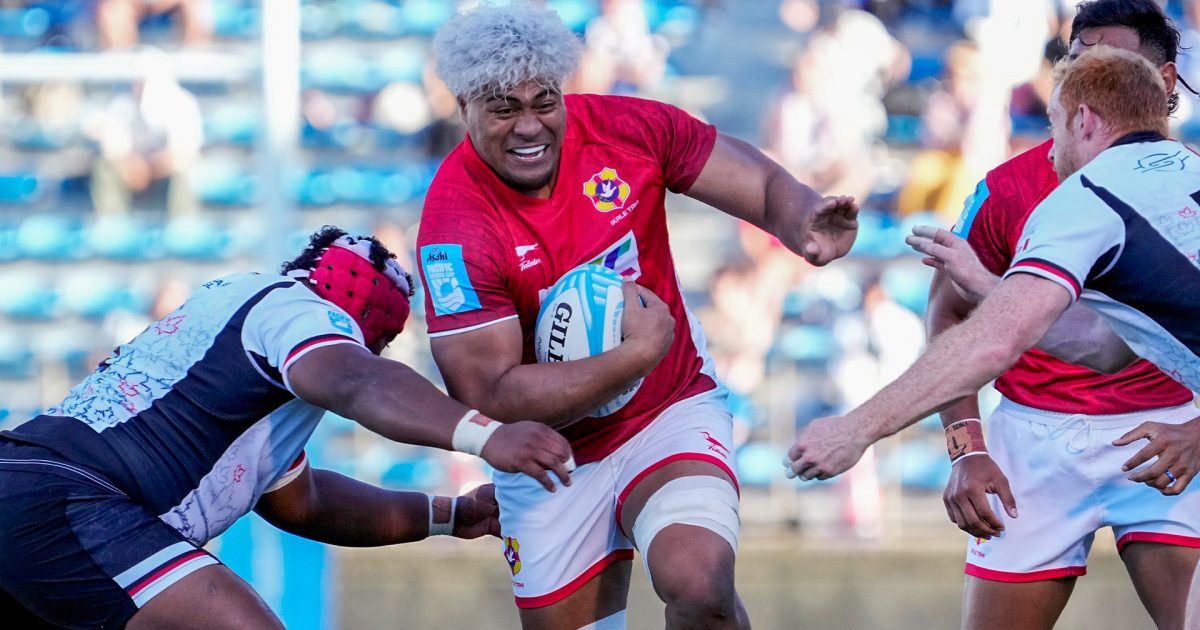
American muscle meets Tongan power as Eagles look for a big Pacific Island scalp

Thanks to a dramatic twenty-one-phase, backs-to-the-goal-line, clock-in-red defensive stand, the USA Eagles pulled off a 21-17 victory over Portugal last weekend.
Impressive fitness and desire aside, the necessity of the heroics came as a result of repeated American miscues and missed opportunities, putting themselves in ever more creatively constructed holes to climb out of. As somewhat of a microcosm of their performances to date, the stand showcased a period of unflappable and impenetrable defensive work on the back of hair-pullingly frustrating decisions.
This week the Eagles will want to, if not consistently execute to their fullest, at least reduce the impact of their moments of pedestrian performance.
On Saturday the USA will meet Tonga in Chambéry, France for an opportunity to build on the performance. Though Tonga has had the advantage in their last three meetings, those clashes date back to 2014 with the most recent coming during the 2019 World Cup.
Tonga, in fact, has had a poor run of play since their 2023 World Cup appearance, with their only win in their last seven matches coming against a struggling Canadian side. That said, the USA have never in recent memory convincingly beat any of the Pacific Island teams, and they’ll gear up for another physical clash on the weekend.
In the American camp, Scott Lawrence, known for hammering on the controllable non-negotiables, will place emphasis on the necessary improvements to set piece and the ensuing strikes. He’ll target an at-times loose Tongan defensive wall, knowing that a rapid and brutal three phase strike should open some doors for the big American ball runners to charge through.
In the Tongan camp, similarly emphasize set piece and cleaning up their attack continuity, aiming to release dangerous playmakers and allow their moments of flair to come off a solid platform.
Overall, both teams will have some key areas to improve in order to control their destiny:
What Tonga Needs to Improve
Maul Defense – Romania mauled repeatedly and seemingly unstoppably over the top of Tonga, producing one try and multiple penalties, including a yellow card. American execution notwithstanding, the Eagles will certainly target this area, so Tonga will need to come up with a better strategy to stymie it. Outside of the maul itself, should the Americans begin galloping down the field as Romania did at times, the Eagles will launch their attack against a backpedaling and shorthanded defense.
Scrum Stability – Similar to the maul, Romania bossed the Tongans at the scrum, producing five penalties and plenty of strong attacking possibilities. More than just front-row dark magic, the Tonga scrum looked unstable from the set-up, with eight bodies pushing at different times and in different directions. Their forwards will spend plenty of time this week organizing into a more cohesive pack.
Patience in Attack – As expected, the Tongan moments of brilliance shined radiantly, but the missed opportunities perhaps darkened the overall hue. Starting with two tries in the first fifteen minutes, they only managed three points for the rest of the match. Consistent knock-ons, forward passes, and general lack of execution repeatedly left opportunities wanting. The Tongans have the talent to break defenses, but they’ll want to rely on more consistent structure to their attack until they see the right opportunity, rather than forcing offloads, passes, and kicks with low probability of success.
What the USA Needs to Improve
Lineout – Winning only 50% of their own lineout, Greg Peterson’s men had a tough day in the lineout. They lost the only two lineouts they had within their opponent’s 22m, including a 5m lineout. With new cap Shilo Klein starting at hooker, one would expect some first-cap jitters, but even the movement and lifts looked a beat out of sync. The Eagles could have the most dangerous backline in the world, but if they cannot rely on clean ball with which to strike, they’ll find themselves repeatedly frustrated and second guessing themselves.
Attacking Connectivity – With AJ MacGinty back in the number ten shirt, he looked every bit the Premiership star, but with a noticeable lack of connectivity with those around him. Multiple times a signature dummy or delayed pass would create space for him to exploit, only to find himself looking left and right for someone to run off his hip. Another week in camp should help this, but the American runners, especially the forwards, will want to make sure they can better anticipate when and how MacGinty will strike.
Consistency in Attack – With an early try by a rampaging Paddy Ryan, the Americans found a successful recipe– hard forward play to disrupt the defense, followed by a field switch off of ten to send the big boys galloping through the Portuguese backs. Somehow they either abandoned or found themselves unable to replicate this pattern for the rest of the match. Similar to the way Romania repeatedly used the maul and scrum throughout the match to consistently punish Tonga, when the Americans find an effective weapon they cannot grow bored of it. Sometimes effective rugby is boring rugby.
The Outcome
The American shortcomings seem far more fixable in a week of camp than a faltering Tongan scrum. Their work-ons rely more on eliminating the bad than building new fundamental proficiencies. However, given that the Tongans will also thrive in broken play similar to the Portuguese, should the Americans give the Tongans enough mistakes to capitalize off of they may not need to manufacture any scoring opportunities themselves. In the end, given that the Eagles improved steadily throughout the PNC, Lawrence and his staff have shown themselves capable of learning and implementing their lessons. USA to win by less than a try (though hopefully not in the last minute again, out of respect for my sanity).



















































